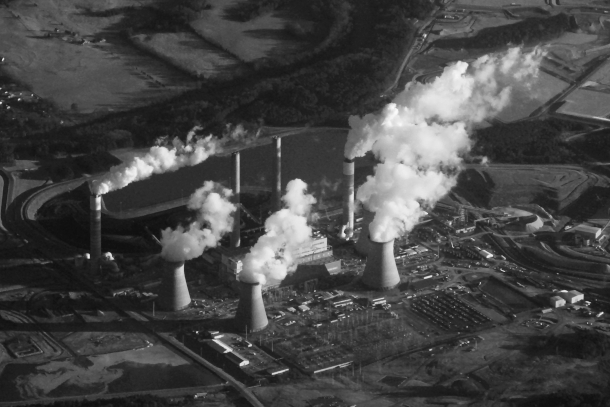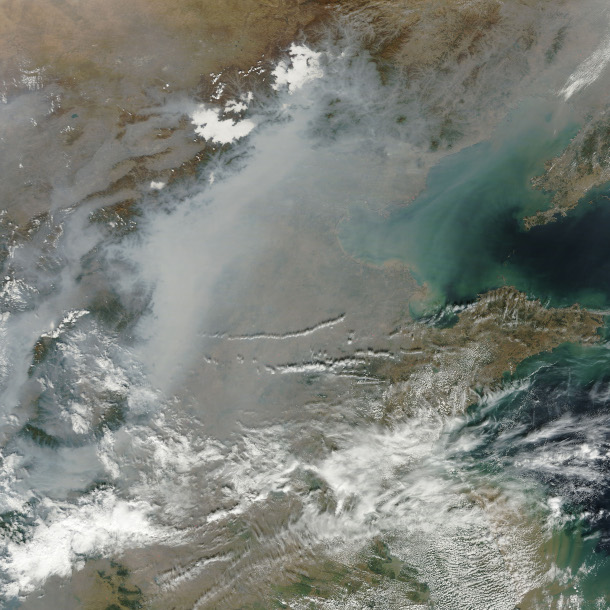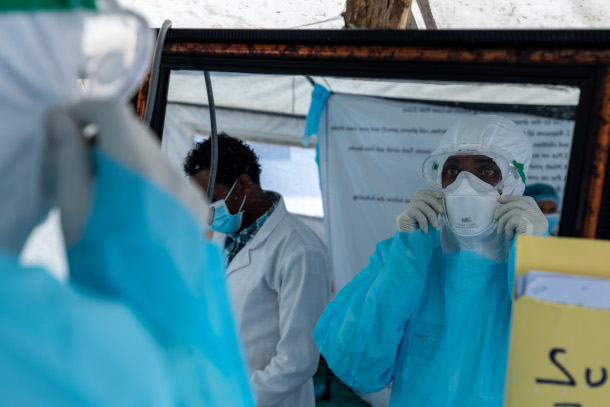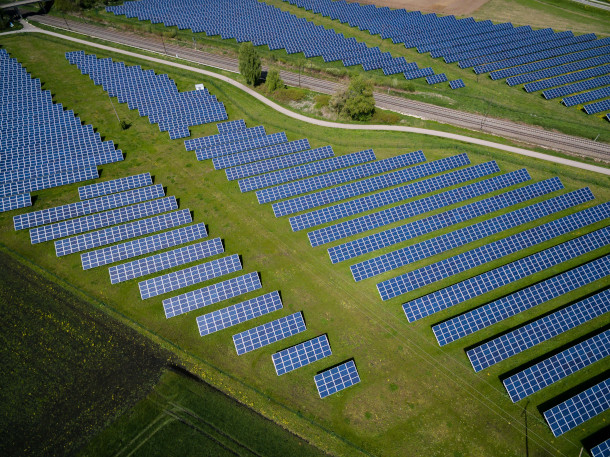One in Five Deaths from Fossil Fuels
Air Date: Week of March 19, 2021

Plant Bowen just outside Euharlee, Georgia. It’s one of the biggest coal-fired plants in North America. The burning of coal is known to produce harmful ultrafine particulate matter. (Photo: formulanone, Wikimedia Commons, CC BY-SA 2.0)
Ultrafine particulate matter emitted from fossil fuel combustion is known to cause numerous health issues, and a recent study finds that this pollution is responsible for one in five early deaths worldwide, including more than 300,000 deaths a year in the United States. Pediatrician Aaron Bernstein, who is the interim director of the Center for Climate, Health and the Global Environment at Harvard, joins Host Steve Curwood to discuss the implications of the research.
Transcript
CURWOOD: While the Covid-19 pandemic killed more than a half million Americans over the last year, a new report finds that every year some 300,000 or more Americans suffer premature deaths directly from burning fossil fuels. Fossil fuels like diesel and coal generate fine particles that can invade lungs and lead to a wide range of health problems including strokes, heart attacks, asthma as well as higher death rates from Covid. Worldwide, researchers found 8 million premature deaths are linked to fossil fuels. The study used methods that exclude other sources of fine particulates and was recently published in the journal Environmental Research. The work was conducted jointly by Harvard University and the Universities of Birmingham and Leicester in the UK. Joining us now is Pediatrician Aaron Bernstein, the interim director of the Center for Climate, Health and the Global Environment at Harvard, though he did not work directly on this study. Dr. Bernstein, welcome back to Living on Earth.
BERNSTEIN: Great to be with you, Steve.
CURWOOD: So this study measured the impact of particulate matter small ones, two and a half microns from only from fossil fuel combustion. Describe to me exactly what this study looked at.
BERNSTEIN: Yeah. So these authors wanted to understand not what air pollution outside in total does to health. They wanted, as you pointed out to understand what the proportion of that pollution that comes from burning fossil fuels does to human health.
CURWOOD: By the way, explain what is a premature death?
BERNSTEIN: So premature death is essentially someone dying before they rightly should. And at a population level, we know that in any given year, people die at certain ages. But when there's more pollution, we see people dying at ages earlier than those usual ages.

NASA satellite capturing a thick layer of haze over the North China Plain. Ground measurements that day revealed high concentrations of PM 2.5, or ultrafine particulate matter. (Photo: NASA Earth Observatory, Flickr, CC By 2.0)
CURWOOD: The numbers that they have here of 350,000 premature deaths every year in the United States. That is an astonishing number. What about around the rest of the world?
BERNSTEIN: Yeah, so globally, they estimate that somewhere around eight plus million people are dying every year from air pollution that comes from burning fossil fuels, which is roughly one in five deaths worldwide, which is just stunning.
CURWOOD: Now, who do these fossil fuel particulates affect the most? What kinds of populations or groups of people are most at risk?
BERNSTEIN: Yeah, it's, it's unfortunately, everybody who can least afford it. So research has shown quite clearly that anyone with a chronic medical condition, particularly people with heart disease, lung disease are at risk. People who are pregnant, or their pregnancies are at risk from this air pollution. There's lots of evidence that children with asthma will get sicker. And there's even some evidence that this air pollution may be causing asthma. We know this air pollution causes lung cancer. And there's a whole host of other nasty stuff that's coming into clear focus around the effects of air pollution on brain health, including on dementia, potentially contributing to diabetes. I should mention important to your question of who's affected most is that it turns out that pollution and poverty are really close bedfellows. And so regardless of where the air pollution happens, it's pretty much universally the case that people who are less well off are breathing more. In the United States, we have definitive evidence that people of color, particularly Black Americans, and Latinx Americans breathe more air pollution than the rest of us. And they are also least responsible for its production, meaning that they consume less goods that, you know, in their production result in the production of these air pollutants.
CURWOOD: Dr. Bernstein, what parts of the United States and the world are most at risk from these premature deaths from fossil fuel particulates?

Healthcare workers securing their personal protective equipment. As of March 2021, worldwide deaths due to COVID-19 were around 2.63 million. The Harvard study revealed approximately 8.7 million people prematurely die annually from fossil fuel pollution. (Photo: UNICEF Ethiopia, Flickr, CC BY-NC-ND 2.0)
BERNSTEIN: Yeah. So this study, and others have shown that the places that are that are really suffering most from this air pollution are in Asia. Particularly in China and India and Southeast Asia, where the lion's share of the mortality from air outdoor air pollution is happening. Now, interestingly, Steve, you know, we've cleaned up the United States, dramatically, everyone's air quality has gotten better. The latest research shows, unfortunately, that the gains have not been equally shared. That in fact, white Americans have benefited most, whereas Black Americans and Latinx Americans have certainly benefited but not as much in the past several decades. But one of the consequences of us cleaning up our air is that we've exported the pollution. So there's been research now looking at how as manufacturing bases have moved, you know, from richer countries to low and middle income countries, that the pollution controls in those places are often less good. And the pollution that's being generated there is substantial. And in some research, for instance, China is certainly the place where the most deaths are occurring for goods that are serving people not in China, and the EU and in the US are the largest purchasers of those goods.
CURWOOD: How fair Dr. Bernstein is it to say nevermind, climate change, global warming from fossil fuels. Just look at the health effects of burning fossil fuels?
BERNSTEIN: Well, I think, you know, there's an interesting history here, Steve. So in the realm of climate change, the kind of health wins we get when we come off fossil fuels that this study shows are what are called the co-benefits, right? That's, that's the term that people use. These benefits aren't really the co-benefits. They are the health benefits of climate action. And I think it's critical that we start talking about them that way. Because to your point, you know, if 300,000 people roughly are dying every year in the United States from fossil fuel air pollution, and you know, 8 million people are dying globally, can you imagine what we would be doing if we treated this like we have COVID? I mean, the world is spending trillions upon trillions of dollars to deal with this pandemic. We're not spending a fraction of that to deal with the air pollution mortality from fossil fuel use.
CURWOOD: Yeah, Dr. Bernstein, when you make that point, we've seen a half a million people, more than half a million people in this country die over the last 12 to 13 months from COVID. But 300 to 350,000 deaths a year from fossil fuels quickly dwarfs that over well, over two years.
BERNSTEIN: You know, this is a global problem. And there's a real need to look at how we are valuing energy and goods when it comes to health. And if we in fact, included the health effects of our production system and the reliance on fossil fuels, we would be off fossil fuels tomorrow, because no one could afford using them.

Solar farm in Offingen, Germany. Commitment to the transition to alternative energy sources is vital to reduce fossil fuel combustion. (Photo: Andreas Gücklhorn, Unsplash, Public Domain)
CURWOOD: So Dr. Bernstein if fossil fuels reflected their true cost, and obviously, it'll be very, very expensive. How do we work through this? What do you think it'll take to make the change?
BERNSTEIN: Yeah, so I think the first thing is, well, let's start accounting for it. You know, one of the things that's important to recognize is that in the United States, some of the rules that come out of the federal government do include health costs, but that is not the rule across federal agencies. But as you point out, you know, we can't even if we did that, we can't just, you know, flip a switch and change, change our economy. And so that's where I think policies that focus on what are the ways to essentially phase out our use of fossil fuels that will, you know, not essentially shoot ourselves in the foot. And also stimulate the needed growth in the alternatives because, of course, we can't just turn off fossil fuels without somewhere to jump to. And that requires real leadership, and really good policymakers who can work with people who understand economics, to implement the systems.
CURWOOD: Dr. Bernstein, what's the most important takeaway from this study? And what's next, do you think?
BERNSTEIN: The most important takeaway here is that we have so much more to gain than we previously understood by getting ourselves off fossil fuels. And that the health gains that we can achieve are going to benefit the folks who have been harmed the most, namely, people who are less well off, people of color, particularly Black Americans and Latinx Americans. And that not only will we improve their health and welfare, but the transition is going to be a huge engine for economic growth. We have so many more jobs to gain in moving to energy systems that do not rely upon fossil fuels, than by trying to do any kind of growth scheme within the realm of fossil fuels. So it is a huge opportunity for health. It's a huge opportunity for equity. It's a huge opportunity for the economy. I also think, Steve, it's critical to point out that there are millions of people in the United States and many more around the world who have spent their lives and in fact, for generations, in many cases, families have spent their lives dedicated to mining, transporting, processing, delivering fossil fuels. And we can't simply move on without addressing the reality that these families need help with this transition. We cannot lead a future with heavy reliance on fossil fuels. Might we have technologies to capture greenhouse gases out of the air that are cost effective? Sure. There's all kinds of technologies that might happen. But the science tells us we need to reduce our emissions massively in the next decade or we're going to be living in a world that people are increasingly not gonna like living in.
CURWOOD: Dr. Bernstein is a pediatrician and interim Chair of the Center for Climate, Health and the Global Environment at the Harvard T. Chan School of Public Health. Dr. Bernstein, thanks so much for taking the time with us today.
BERNSTEIN: Great to be with you, Steve. Thanks for having me.
Links
Listen to an April 2020 LOE story on the harmful health effects of fine particulate matter
Living on Earth wants to hear from you!
Living on Earth
62 Calef Highway, Suite 212
Lee, NH 03861
Telephone: 617-287-4121
E-mail: comments@loe.org
Newsletter [Click here]
Donate to Living on Earth!
Living on Earth is an independent media program and relies entirely on contributions from listeners and institutions supporting public service. Please donate now to preserve an independent environmental voice.
NewsletterLiving on Earth offers a weekly delivery of the show's rundown to your mailbox. Sign up for our newsletter today!
 Sailors For The Sea: Be the change you want to sea.
Sailors For The Sea: Be the change you want to sea.
 The Grantham Foundation for the Protection of the Environment: Committed to protecting and improving the health of the global environment.
The Grantham Foundation for the Protection of the Environment: Committed to protecting and improving the health of the global environment.
 Contribute to Living on Earth and receive, as our gift to you, an archival print of one of Mark Seth Lender's extraordinary wildlife photographs. Follow the link to see Mark's current collection of photographs.
Contribute to Living on Earth and receive, as our gift to you, an archival print of one of Mark Seth Lender's extraordinary wildlife photographs. Follow the link to see Mark's current collection of photographs.
 Buy a signed copy of Mark Seth Lender's book Smeagull the Seagull & support Living on Earth
Buy a signed copy of Mark Seth Lender's book Smeagull the Seagull & support Living on Earth

